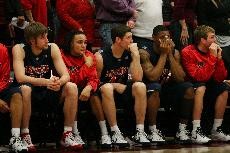Analysis
STANFORD, Calif. – The Arizona men’s basketball program went 23 years without losing three straight Pacific 10 Conference games before doing so last year.
After losing to Stanford Thursday night in Maples Pavilion, it took the Wildcats just four games this season to suffer another such streak.
The Wildcats previously lost three in a row in conference play back in 1983-84, better known as Lute Olson’s first season in Tucson, the school’s last year without an NCAA Tournament berth and also the last time Arizona lost three of its first four conference games before this year.
And things won’t be getting easier with California and No. 8 Washington State on the docket before a trip to Los Angeles.
The Wildcats could very easily have their 1-3 conference record flipped around with a little execution down the stretch in their previous two Pacific 10 Conference road games.
“”We’ve got to learn how to close games,”” said UA interim head coach Kevin O’Neill. “”We had some really good looks at the basket when we were up 3. (Guard) Jerryd (Bayless) had two wide-open 3s that he normally makes, and it’s just unfortunate we didn’t put ourselves in a better position.””
In the Stanford loss and the Jan. 9 loss at ASU, the Wildcats had a number of opportunities to steal a road win down the stretch.
Against the Cardinal in crunch time guard Nic Wise could not control a tough inbounds pass, forward Jordan Hill lost the ball on a play he said he was hit on the hand by Stanford Brook Lopez – a no-call an irate O’Neill clearly disagreed with – and Wise missed a pair of crucial free throws with the Wildcats down two with 46.6 seconds left.
That’s not to mention Bayless’ missed jumper with nine seconds remaining that could have made the preceding mishaps no big deal at all.
“”Everybody was missing free throws,”” Wise said of Stanford missing the front end of a pair of one-and-ones as well as his shots, “”but we needed those free throws to tie it up to give us a better chance to go down on the other end and get a stop and push the game into overtime. We also had another chance with Jerryd, but we just didn’t convert.””
Stanford head coach Trent Johnson sees these kinds of games as being a product of how tough the Pac-10 is, being that it’s ranked as the nation’s second-best conference by the RPI.
“”When you get teams as competitive with talent as there are in this league, sometimes it’s the way the ball bounces,”” Johnson said. “”A free throw, a shot here could go either way. There’s going to be a lot of games like this.””
O’Neill noticed the parallel that in both of Arizona’s last two losses the Wildcats led late before giving up a crucial 3 in the final five minutes, with ASU guard Ty Abbott nailing a critical long ball that cut an Arizona lead to two and Stanford forward Lawrence Hill knocking down a go-ahead 3.
“”It’s the same story, we’ve had two road games that when you lead late and give up 3s you’re not closing the game, and this game in particular we had a ton of shots,”” O’Neill said. “”Ton of shots.””
The Wildcats have legitimate “”what if”” type questions to ask about all three of those previous losses.
What if Bayless had been healthy against Oregon, giving Arizona enough depth and offense to match up, or the Wildcats got a few key stops at the end?
What if Sun Devils guard James Harden was called for an offensive foul or travel on one of his wild drives down the stretch or Budinger didn’t miss eight 3-pointers at ASU?
What if Budinger and Bayless made more than eight of their 30 shots against the Cardinal and Hill didn’t get into more foul trouble?
But “”what ifs”” don’t matter in the standings, where the Wildcats have serious catching up to do.
“”It’s unfortunate,”” O’Neill said. “”That’s two in a row we’ve had like this in the Pac. We’re in a little bit of a hole now at 1-3.””
The type of hole unprecedented in Arizona’s past 23 seasons of Pac-10 dominance.









